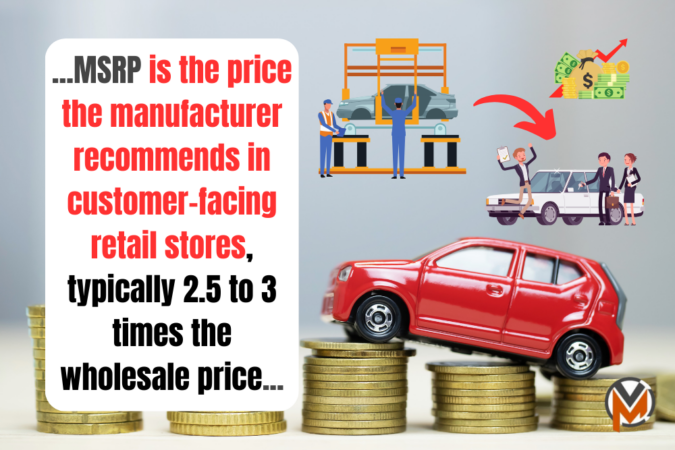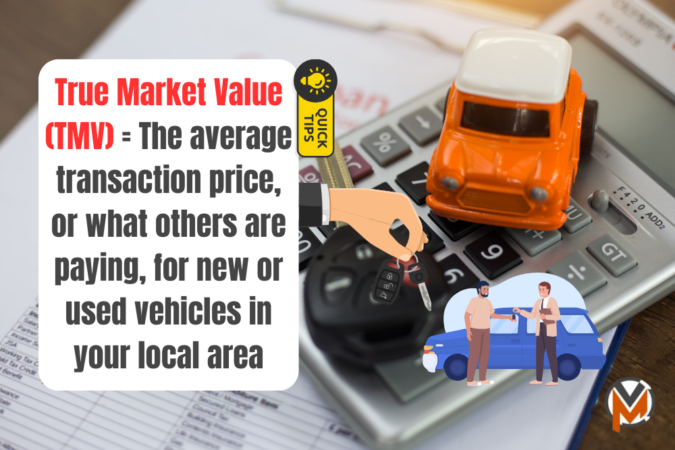Getting a brand-new car is no cheap expense and with rising car prices as of late, this new norm could get worse. Most people check the MSRPs online before visiting a dealership, but the prices at the dealerships are sometimes far from the MSRP, due to varying factors. However, how much off the MSRP on a new vehicle can I really negotiate?
Well, quite a bit, actually. If the particular car that you’re looking at is in high demand, you can negotiate a 3 to 5% discount offer. If it’s a low-demand car instead, expect a discount of up to 10%. The car’s market value will determine how much profit the dealer will forfeit to make a sale, and how much you stand to save.
Depending on market conditions, you may be able to negotiate a purchase at the invoice price. The invoice price is what the car manufacturer charges the dealer, before the dealership tacks on their margins on top of that, before selling it to you. So, here’s a quick look at how much off the MSRP can I negotiate from a new car…
What Does MSRP Mean?
The Manufacturer Suggested Retail Price (MSRP) of a product is the price the manufacturer recommends in customer-facing retail stores.
MSRP is typically 2.5 to 3 times the wholesale price. Retail establishments typically set their list price at or below the MSRP. The MSRP is frequently used in sales to show the discount available due to the seller’s volume of purchases or the manufacturer’s promotions.
Concentrate any negotiations on the dealer cost. A reasonable price for an average car is 2 percent above the dealer’s invoice price. It may be easier to negotiate on the MSRP price of a low-selling car than a car that’s in high demand. Typically, salespeople will try to negotiate based on the MSRP.
The additional cost above a manufacturer’s or wholesale price is generally required to cover the costs associated with producing the product and running a retail store. Dealership showrooms, commissions to salespersons, salaries for their staff, electricity bills, property rental, and so on, are reasons why dealers need to charge you extra.
How To Bargain The Price For A New Car?
Negotiating for a new car can feel absurd, like pitting a novice against a team of professionals. However, establishing ground rules early on can level the playing field. There’s more to buying a car than just getting the best deal. You can’t expect a salesperson to refer you to the competitor down the street, but good ones know a lot about the cars they sell and who they might suit.
And they will make every effort to find the best one for you. It would be a mistake to dismiss what they have to say if you are still in the shopping mode rather than the buy-it-now mode. When you begin bargaining, start with your strongest points:
- Base your opening bid on the dealer’s purchase price or what you’ve determined to be a fair price.
- Bids from other nearby dealerships or car-buying websites.
The salesperson will likely start the conversation by focusing on the vehicle’s MSRP or your monthly payment. Don’t go down that road. By focusing on your monthly payment, the salesperson can group the entire process: the price of the new vehicle, the trade-in, and, if applicable, financing.
If they start with price, make sure you start at the lowest price and work your way up, not from the MSRP. Instead, insist on dealing with one issue at a time. Your priority should be to negotiate the best deal on a new vehicle. After securing that, you should start talking about a trade-in or financing.
What Is True Market Value (TMV)?
A free appraisal tool calculates your vehicle’s True Market Value (TMV), so you can get the most when you sell or trade it. Edmunds True Market Value (TMV) is a pricing system that assists you in determining the average transaction price, or what others are paying, for new or used vehicles in your area so that you can begin negotiations with a reasonable price in mind.
TMV has recently been rebranded as Edmunds Suggested Price for new vehicles, and the naming for used car appraisals has been removed. Edmunds Suggested Price is beneficial when used with a price quote from a dealer or when you’re at the dealer inquiring about a vehicle. Of course, there are plenty of other tools and services besides Edmunds to calculate a car’s TMV.
Dealer Invoice Price vs MSRP
Both invoice price and MSRP describe the cost of a vehicle, but it’s critical to understand how they differ so you can negotiate a fair price. The MSRP, or manufacturer’s suggested retail price, is the price at which car manufacturers recommend dealerships sell their vehicles.
The cost difference between the MSRP and the invoice price can vary proportionally and numerically. For example, an economy car with no options in the base trim level would likely have a slight difference between the MSRP and the invoice. On the other hand, a popular luxury vehicle may have a significant difference in invoice price and MSRP.
What is the invoice price? The invoice price is the amount paid by the dealer to the vehicle’s manufacturer. The difference is kept as profit if a dealership can sell a car for more than the invoice price. The invoice price typically includes the vehicle’s base price and any additional costs incurred by the manufacturer, such as advertising.
Best Times To Buy A Car (To Get A Better Deal)
Begin the negotiation by asking, “Is that your best price?” Take a friendly, upbeat approach. Body language and facial expressions are important. Look interested, but not so eager that they think you’ll buy anyway. Be nice and smile, but be prepared to walk away if necessary. Besides negotiating with the dealership, choosing when to buy a car matters, as well.
There are times when you are far more likely to get a good deal than others. Timing the market is actually a pretty smart strategy, and this applies to buying a new car, too. Knowing when to buy can save you thousands of dollars on the cost of a new car and its financing. These are some of the best times and moments to purchase a new car.
- Before you need one.
- The month’s end.
- Mondays.
- Three-day weekends.
- The month of May.
- October to December.
- New Year’s Eve and year-end sales.
- Black Friday.
- When there are incentives, rebates, or financing offers.
- Model year-end.
- When a car is redesigned or discontinued.
1. Should You Buy A New Car?
Buying a new car can be both exciting and stressful at the same time. It’s never been easier to research and find the right vehicle at a good deal. Due to the recent and ongoing semiconductor chip shortage and resulting vehicle shortage, prices for both new and used cars have reached all-time highs. This has been exacerbated by supply chain issues and the increasing cost of living.
Today’s car buyers have limited choices and high prices due to dealer-added accessories or “market adjustments.” Discounts are scarcer than the cars themselves, giving buyers no bargaining power. As such, if your budget doesn’t permit buying a new car on the market, even after timing the market or haggling with the dealer, it might be a good idea to look at used cars, instead.
2. How’s The Behind-The-Scenes Of Buying A New Car?
While we’re here, some have also wondered how long it takes to buy a new car. Well, it all depends. While the timing varies, many dealerships have simplified the car-buying process since the COVID-19 pandemic. Once you’ve decided on a vehicle, you can complete the transaction within two to three hours. It’s even faster if you buy an in-stock car.
To help expedite the process, the financial side of buying a new car needs to be considered, as well. Knowing your credit score and getting pre-approved loan approval is essential if you plan to finance the vehicle. You could also choose to have the vehicle factory-ordered, which takes little time. But, a new factory order will add to the time.
Speaking of how much can you negotiate off the MSRP on a new car, car prices are also going down. After reaching a record high of $47,243 in December 2021, the average new car transaction price fell to $46,404 in January 2022. Following 2023 and 2024, the average new car transaction price has since normalized to pre-COVIC pandemic levels.
3. How Much Is A Dealer’s Discount?
Unless the particular car is trendy, a 1 to 5% dealer discount on a new vehicle is reasonable. The value can be as high as 10 to 15% if the car isn’t selling well. Another thing to consider is corporate discounts. If you work for a PSU, a large MNC, or a well-known corporate firm, request a corporate discount from the dealership.
When purchasing a used car, keep in mind that there are two prices to consider: the wholesale price and the retail price. So far, after peaking during the COVID-19 pandemic, both wholesale and retail prices have decreased. You can bring this down even further if you know how much you can negotiate off the MSRP of a new car.



